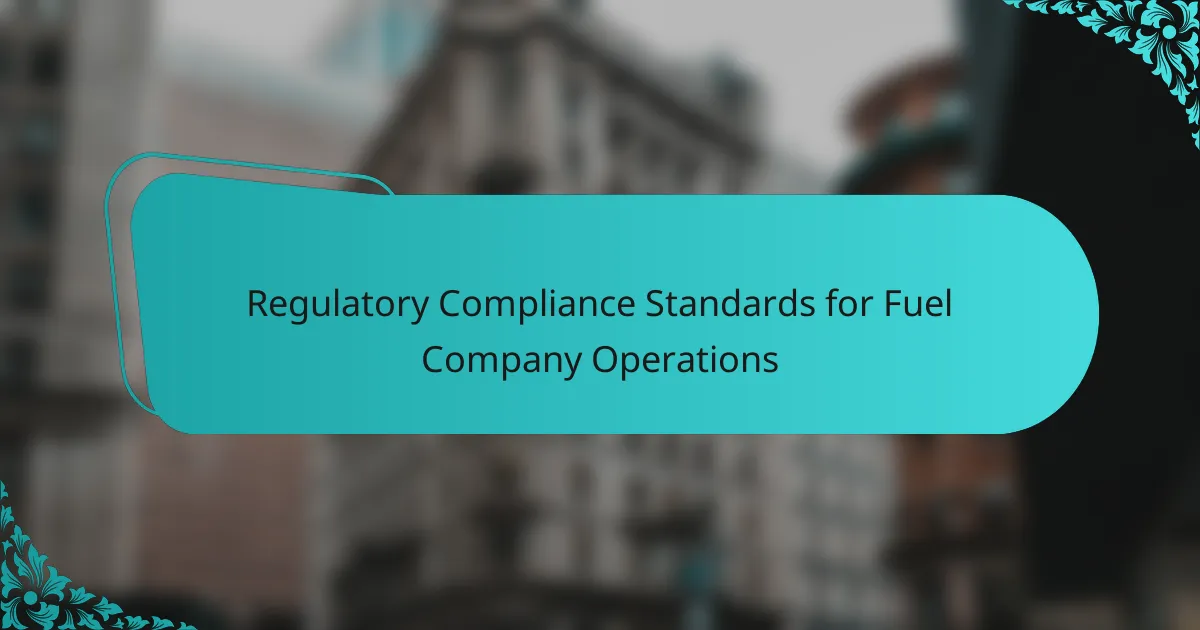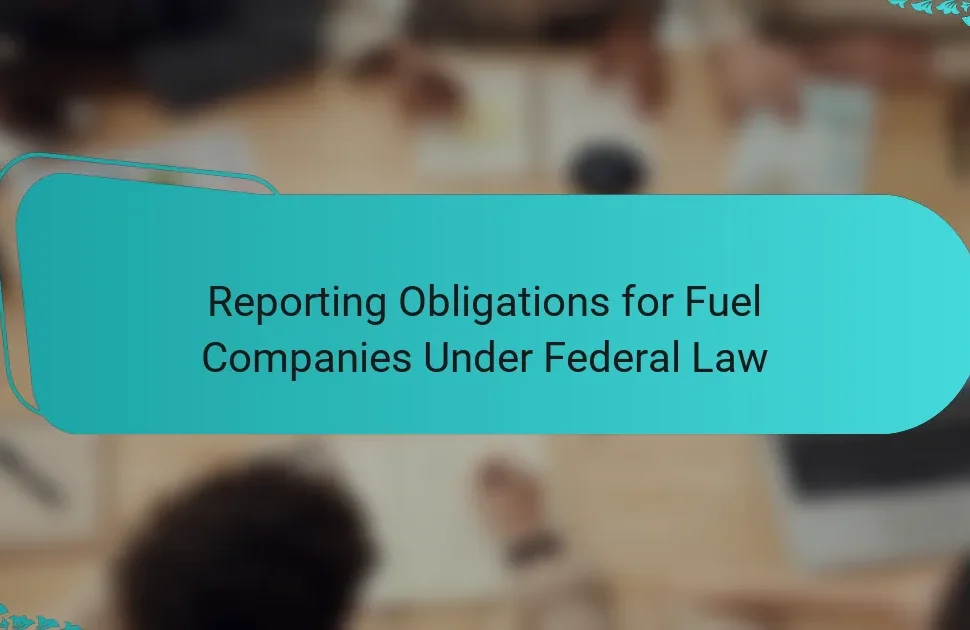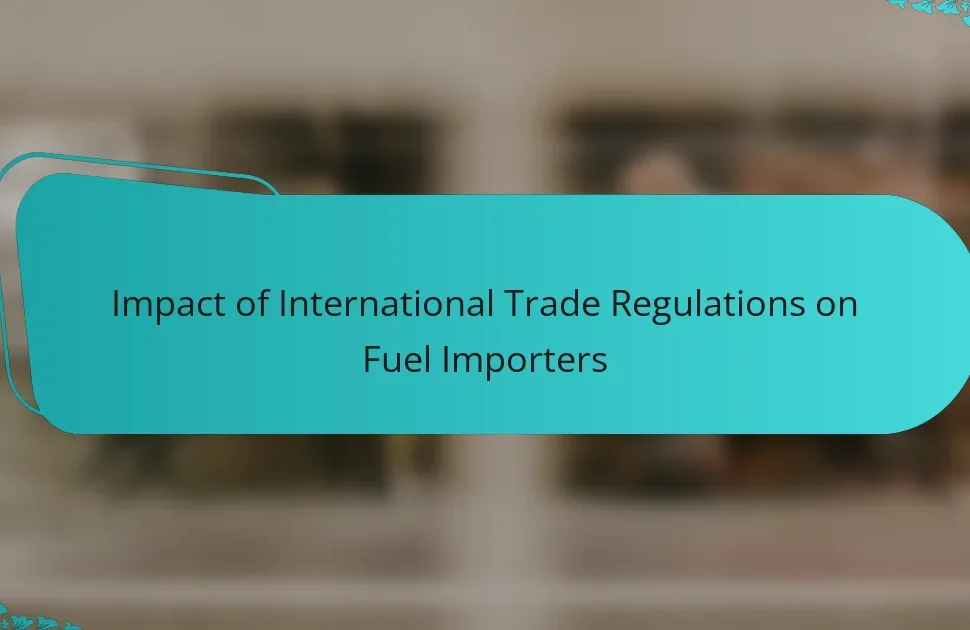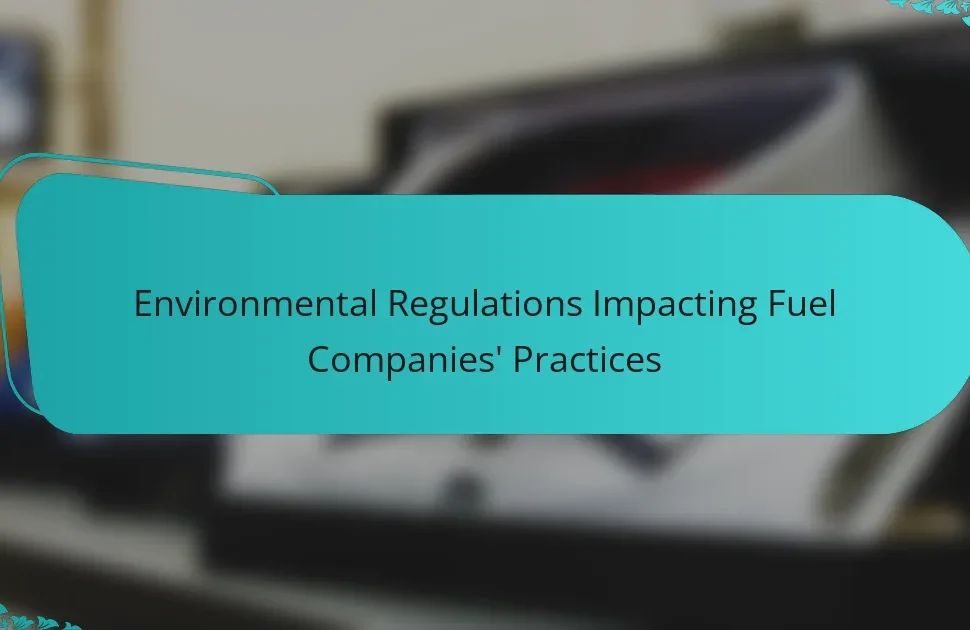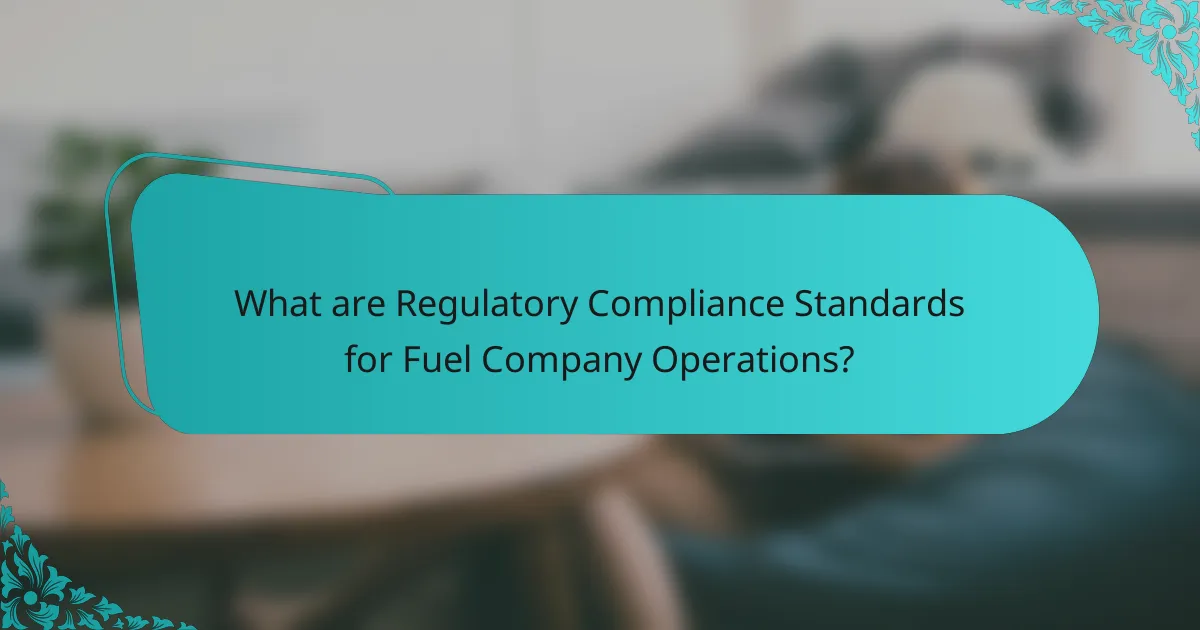
What are Regulatory Compliance Standards for Fuel Company Operations?
Regulatory compliance standards for fuel company operations are guidelines that ensure safety, environmental protection, and legal adherence. These standards are set by government agencies and industry bodies. They cover various aspects such as emissions control, safety protocols, and reporting requirements. For instance, the Environmental Protection Agency (EPA) regulates air and water quality standards for fuel operations. Additionally, the Occupational Safety and Health Administration (OSHA) establishes safety standards to protect workers. Compliance with these standards is crucial to avoid legal penalties and promote sustainability. Fuel companies must regularly audit their operations to ensure adherence to these regulations.
Why are Regulatory Compliance Standards important for Fuel Companies?
Regulatory compliance standards are crucial for fuel companies to ensure safety and environmental protection. These standards help mitigate risks associated with fuel production, storage, and distribution. Compliance reduces the likelihood of accidents, spills, and other hazardous incidents. Moreover, adherence to these regulations can enhance a company’s reputation and build public trust. In the United States, the Environmental Protection Agency (EPA) sets stringent regulations that fuel companies must follow. Non-compliance can result in hefty fines and legal consequences. Additionally, meeting these standards often leads to operational efficiencies and cost savings. Overall, regulatory compliance is integral to sustainable and responsible fuel industry practices.
How do these standards impact operational efficiency?
Regulatory compliance standards enhance operational efficiency by streamlining processes and reducing risks. These standards provide clear guidelines that fuel companies must follow. By adhering to these guidelines, companies can minimize errors and improve safety. Efficient operations reduce downtime and increase productivity. Compliance also fosters trust with stakeholders and customers. According to a study by the International Journal of Business and Management, companies that prioritize compliance report a 30% increase in operational efficiency. This correlation highlights the importance of regulatory standards in optimizing fuel company operations.
What role do these standards play in safety and environmental protection?
Regulatory compliance standards play a critical role in safety and environmental protection. They establish guidelines to minimize risks associated with fuel operations. These standards ensure that companies implement safety measures to protect workers and the public. They also mandate environmental practices to reduce pollution and conserve resources. Compliance with these standards helps prevent accidents and environmental disasters. For instance, the Environmental Protection Agency (EPA) sets regulations that limit emissions from fuel processing. Adherence to these standards is essential for maintaining air and water quality. Moreover, they promote sustainable practices within the fuel industry. Overall, these standards are vital for safeguarding health and the environment.
What types of Regulatory Compliance Standards exist for Fuel Companies?
Fuel companies must adhere to various regulatory compliance standards. These standards include environmental regulations, safety standards, and operational guidelines. Environmental regulations often focus on emissions control and waste management. The Clean Air Act and the Clean Water Act are key examples in the United States. Safety standards are enforced by agencies like OSHA, ensuring worker safety and hazard communication. Operational guidelines can include industry-specific standards such as API standards for petroleum and natural gas. Compliance with these standards is crucial for legal operation and environmental protection.
What are the federal regulations governing fuel operations?
Federal regulations governing fuel operations are primarily outlined by the Environmental Protection Agency (EPA) and the Department of Transportation (DOT). The EPA enforces regulations related to air quality, hazardous waste management, and fuel standards. The Clean Air Act mandates emissions standards for fuel production and distribution. The DOT oversees the transportation of hazardous materials, including fuel, under the Hazardous Materials Regulations (HMR). These regulations ensure safety in fuel handling and transportation. Compliance with these federal regulations is essential for fuel companies to operate legally and safely. Violations can result in significant fines and operational shutdowns.
How do state regulations differ from federal standards?
State regulations can differ significantly from federal standards in various ways. State laws may impose stricter requirements than federal regulations. For example, states can establish their own emission standards that exceed federal guidelines. This is often seen in environmental regulations, where states aim for higher air quality. Additionally, states may have specific licensing requirements for fuel companies that are not mandated at the federal level. These variations can lead to a complex compliance landscape for fuel companies operating in multiple states. Furthermore, states have the authority to enforce penalties that may differ from federal enforcement actions. This can result in different legal consequences for non-compliance based on the jurisdiction. Overall, while federal standards provide a baseline, state regulations can create additional layers of compliance that fuel companies must navigate.
How do Fuel Companies ensure adherence to Regulatory Compliance Standards?
Fuel companies ensure adherence to regulatory compliance standards by implementing comprehensive compliance programs. These programs include regular audits and assessments of operations. They also provide extensive training for employees on regulatory requirements. Fuel companies maintain detailed documentation of compliance efforts. They collaborate with regulatory agencies to stay updated on changes in laws. Additionally, they utilize technology for monitoring and reporting compliance metrics. Regular reviews and updates of compliance policies are conducted to align with evolving standards. These practices help mitigate risks and ensure legal compliance in fuel operations.
What processes are involved in compliance audits?
Compliance audits involve several key processes. The first process is planning, which includes defining the scope and objectives of the audit. Next, auditors gather relevant documentation and data related to compliance standards. This is followed by conducting interviews with personnel to assess understanding and implementation of compliance measures.
After data collection, auditors analyze the information to identify any discrepancies or areas of non-compliance. The next step is to document findings in a clear and structured report. Finally, the audit concludes with a review meeting to discuss results and recommendations for corrective actions.
These processes ensure that organizations adhere to regulatory compliance standards, thereby mitigating risks and enhancing operational integrity.
How do training programs contribute to compliance efforts?
Training programs enhance compliance efforts by educating employees about regulatory standards and best practices. They provide essential knowledge on legal requirements specific to fuel company operations. This education helps employees understand their roles in maintaining compliance. Moreover, training programs can reduce the risk of violations and associated penalties. According to a study by the Society for Human Resource Management, organizations with effective training programs experience fewer compliance issues. Training also fosters a culture of accountability and ethical behavior within the organization. Employees who are well-informed are more likely to adhere to compliance protocols. Ultimately, training programs are critical for ensuring that all staff members are equipped to meet regulatory requirements.
What challenges do Fuel Companies face regarding Regulatory Compliance?
Fuel companies face numerous challenges regarding regulatory compliance. These challenges include navigating complex regulations, which vary by region and can change frequently. Compliance costs can be significant, impacting operational budgets. Additionally, fuel companies must ensure that their practices align with environmental standards to minimize ecological impact. The enforcement of regulations can lead to penalties for non-compliance, adding financial risk. Moreover, companies often struggle with keeping up-to-date with evolving legislation and technological requirements. Training employees on compliance protocols is another hurdle, as it requires time and resources. Finally, maintaining transparency and accurate reporting to regulatory bodies is essential and can be burdensome.
How do changes in legislation affect compliance strategies?
Changes in legislation significantly impact compliance strategies. When new laws are enacted, companies must adjust their operations to meet updated requirements. This often involves revising internal policies and procedures. Compliance teams may need to conduct training sessions to educate employees on these changes. Additionally, organizations might invest in new technologies to ensure adherence to regulations. Non-compliance can lead to penalties, making it essential for companies to stay informed. Historical examples show that failure to adapt can result in legal consequences and financial losses. Regular audits can help identify gaps in compliance strategies following legislative changes.
What are common pitfalls in achieving compliance?
Common pitfalls in achieving compliance include lack of understanding of regulations, inadequate training, and poor documentation. Organizations often fail to fully grasp the regulatory requirements specific to their operations. This misunderstanding can lead to non-compliance and potential penalties. Inadequate training of employees on compliance protocols can result in errors and oversights. Furthermore, poor documentation practices hinder the ability to demonstrate compliance during audits. According to a study by the Compliance, Governance and Oversight Council, 60% of organizations reported documentation as a significant compliance challenge. These pitfalls can severely impact a company’s ability to operate within legal standards and maintain its reputation.
What are the consequences of non-compliance for Fuel Companies?
Fuel companies face significant consequences for non-compliance with regulatory standards. These consequences include hefty financial penalties, which can reach millions of dollars depending on the severity of the violation. Additionally, non-compliance may lead to legal actions, including lawsuits from regulatory bodies or affected parties.
Reputational damage is another critical consequence, as public trust can diminish significantly. This loss of trust can result in decreased sales and market share. Furthermore, fuel companies may encounter operational restrictions, such as the suspension of licenses or permits necessary for business operations.
In some cases, non-compliance can also lead to increased scrutiny from regulators in the future. This heightened oversight can complicate operational processes and increase compliance costs. Overall, the repercussions of non-compliance can severely impact a fuel company’s financial stability and long-term viability.
What financial penalties can be imposed for non-compliance?
Financial penalties for non-compliance in regulatory standards for fuel company operations can be significant. These penalties may include fines that can range from thousands to millions of dollars. The exact amount often depends on the severity and nature of the violation. For example, the Environmental Protection Agency (EPA) can impose fines of up to $37,500 per day for violations of the Clean Air Act. Additionally, companies may face increased scrutiny and additional costs related to remediation efforts. Non-compliance can also lead to loss of licenses or permits, which can further impact financial stability.
How can non-compliance impact a company’s reputation?
Non-compliance can severely damage a company’s reputation. It leads to public distrust and skepticism about the company’s integrity. Customers often prefer to engage with compliant businesses. Regulatory fines and penalties can also attract negative media attention. This negative publicity can linger, impacting customer perception long-term. A tarnished reputation may result in decreased sales and loss of market share. Companies may struggle to attract top talent due to reputational harm. Research indicates that 75% of consumers will not buy from non-compliant companies.
How can Fuel Companies stay updated on Regulatory Compliance Standards?
Fuel companies can stay updated on regulatory compliance standards by regularly monitoring government publications and industry reports. They should subscribe to updates from regulatory bodies such as the Environmental Protection Agency (EPA) and the Department of Energy (DOE). Attending industry conferences and workshops also provides valuable insights into compliance changes. Engaging with industry associations can facilitate networking and information sharing among peers. Utilizing compliance management software can streamline tracking of regulations and deadlines. Conducting regular training sessions for staff ensures everyone is informed about compliance requirements. Finally, consulting legal experts in environmental law can provide clarity on complex regulations.
What resources are available for monitoring compliance changes?
Resources available for monitoring compliance changes include regulatory databases, compliance management software, and industry publications. Regulatory databases provide real-time updates on changes in laws and regulations. Compliance management software helps organizations track and manage compliance obligations effectively. Industry publications offer insights and analyses on compliance trends and best practices. Utilizing these resources ensures that fuel companies remain informed and compliant with evolving regulatory standards.
How can industry associations assist in compliance education?
Industry associations can assist in compliance education by providing resources and training programs. They develop educational materials that clarify regulatory requirements. These materials may include guides, webinars, and workshops tailored to industry needs. Associations also facilitate networking opportunities among members to share best practices. They often collaborate with regulatory bodies to ensure accurate information dissemination. Regular updates on changing regulations are provided to keep members informed. Research shows that companies engaged with industry associations report higher compliance rates. This highlights the effectiveness of associations in enhancing compliance education.
What best practices can Fuel Companies adopt for effective compliance?
Fuel companies can adopt several best practices for effective compliance. First, they should implement a comprehensive compliance management system. This system should include regular training for employees on regulatory requirements. Additionally, companies must conduct frequent audits to identify compliance gaps. They should also maintain accurate documentation of all operations and transactions. Establishing a culture of compliance within the organization is crucial. This can be achieved by promoting accountability at all levels. Moreover, staying updated with regulatory changes is essential for ongoing compliance. Collaborating with legal experts can provide valuable insights into complex regulations. These practices collectively enhance compliance and reduce the risk of violations.
How can technology enhance compliance monitoring?
Technology enhances compliance monitoring by automating data collection and analysis. Automated systems reduce human error and improve accuracy. Real-time monitoring tools provide instant alerts for compliance breaches. Data analytics software identifies trends and potential risks efficiently. Cloud-based solutions enable secure document storage and easy access for audits. Blockchain technology ensures data integrity and transparency in transactions. These advancements lead to more effective compliance management and reduced operational risks.
What role does employee engagement play in maintaining compliance?
Employee engagement plays a critical role in maintaining compliance within organizations. Engaged employees are more likely to understand and adhere to regulatory standards. They actively participate in compliance training and discussions. This participation fosters a culture of accountability and responsibility. Research indicates that companies with high employee engagement have 30% lower compliance violations. Engaged employees are also more likely to report unethical behavior. This proactive reporting helps organizations address compliance issues promptly. Therefore, enhancing employee engagement directly contributes to better compliance outcomes.
Regulatory compliance standards for fuel company operations are essential guidelines established by government agencies and industry bodies to ensure safety, environmental protection, and legal adherence. This article covers the various types of compliance standards, including environmental regulations and safety protocols, and discusses their significance in enhancing operational efficiency and preventing legal penalties. It also examines the challenges fuel companies face in maintaining compliance, the consequences of non-compliance, and best practices for effective adherence. Additionally, the role of training programs and technology in supporting compliance efforts is highlighted, providing a comprehensive overview of the regulatory landscape in the fuel industry.
